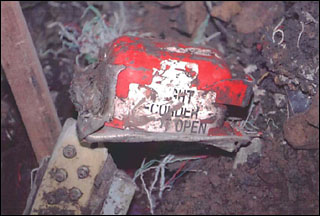
Paul Greengrass, 2006
Subject
Evaluation
Commentary
Adam says, "Hijacked plane from Pittsburgh now circling over DC" Of course, as it turned out, the plane was not from Pittsburgh but rather had crashed nearby, had been headed for DC but never come close, and had never been in danger of being shot down because the military never got its act together. But the part about it being sick-making to think about what was going on inside the plane was accurate. And with United 93, here it is in widescreen. The murder of forty people would be awful to contemplate anywhere, of course, but something about a plane makes it even worse. I think it's the fact that since every plane is basically the same, with an identical set of rituals, anyone who's been on a plane can look at something happening in any other plane and think, "Whoa, I've been there!" The same can't really be said for a brokerage firm in the World Trade Center or a command post in the Pentagon. Of course, there are distinguishing touches. If at any point I needed a reminder that I could have happened to be on one of the hijacked planes just as easily as any of these people, all I had to do was look at that Cal baseball cap. At the time, though, my remark notwithstanding, I was too caught up in the adrenaline rush of a crisis to really dwell on what was happening in the planes. Once I knew Jennifer was okay, I was first fixated on tracking every last development, and then once new information started to die down, I worried about the response. Though it seems silly in retrospect, on September 11th anything seemed possible. Maybe mobs would form. Maybe the US would launch a nuclear strike. Maybe the attacks would be used as a pretext for disastrous foreign wars and an assault on civil liberties. It seemed vital to keep a sense of perspective. Twice as many people were killed on September 11th by smoking-related illness than by terrorists. Fewer than one one-hundredth as many American civilians were killed on September 11th than Iraqi civilians were killed in the five years that followed. Terrorists cannot launch a large attack the way an army can. Terrorism depends on people being disproportionately scared by a small attack. And it worked. I don't think Dennis Miller has stopped wetting his pants yet, even as his chance of death by terrorist attack has increased by maybe 0.0001%. But for the people on the plane, the fear was not disproportionate. They were about to die. I was driving northbound on I-880 in January 2006 when the horror of their situation struck me and I started to cry. Theirs, and that of the people in the towers, and of everyone who had to make final phone calls, everyone who had to brace for terrible impact, be it on the side of Skyline Road or on the plaza above Vesey Street.
Spatch says, "I wonder where the plane that crashed in Pittsburgh was headed,
target-wise" Because United 93 doesn't really tell those of us in 2006 anything we didn't know, at first I thought that maybe it was made for future generations to whom September 11th will be just a name in history books, like Pearl Harbor. But Roger Ebert made an interesting point when he wrote, "It is not too soon for United 93, because it is not a film that knows any time has passed since 9/11." That may be right. Maybe the film was made primarily not for the present or for the future, but for the past. Maybe it was made to give a belated answer to Steve and everyone else on that day who had the same thought: Yes, it's true.
Return to the Calendar page! |

